#All the basic code is functional and I just need to make the time loop work
Explore tagged Tumblr posts
Text
Devlog: they should invent a Bug Testing that doesn't make my head feel like it's caving in
#I finished the bug testing. Strongest man alive#All the basic code is functional and I just need to make the time loop work#but I've tested all the individual loops and they're working. I just gotta make the game transition between them#I'm also thinking of releasing just the first loop as a demo sometime next week for the Queer Mecha gamejam#If I can finish the art before then (perfectly achievable) it'll happen#so. That's exciting!#devlog#Nothing Like You#nz.txt
6 notes
·
View notes
Note
Hi! Could I request a platonic ignihyde fic with a child reader who is surprisingly good at coding?

Ignihyde with a Child!reader who is good at coding

Idia Shroud
To say Idia was surprised when Crowley dropped a literal child into his dorm would be an understatement.
He had stared, wide-eyed and frozen, the corners of his mouth twitching with something between panic and suspicion.
“…Okay,” he muttered. “Okay. The headmage finally snapped. I’m hallucinating a child. A child with a backpack. And stickers on their tablet.”
You, meanwhile, were silent. You stared up at the tall, nervous man in the oversized hoodie and fire-blue hair and tilted your head slightly.
“…You’re Idia Shroud,” you said flatly, stepping into his room uninvited and peering at his screens. “Your garbage collector keeps triggering on a five-second cycle. That’s inefficient.”
Idia made a strangled noise. “Wha—?!”
“I can fix it,” you added.
You sat down beside him like you’d done it a hundred times, pulling your tablet out and typing with quiet precision.
And somehow, Idia let you.
It was weird, having someone near him who didn’t need constant social buffering. You weren’t loud. You didn’t force him to talk when he didn’t want to. You liked silence, blinking cursors, logic loops, and cat-themed IDE skins.
Idia thought he might actually be dreaming.
Still, he kept his distance for a while. You were a kid. What if you cried when he got snappy? What if you tripped and broke a server blade? What if Ortho accidentally sent you to the Shadow Realm during VR testing?
But you didn’t cry. You didn’t break anything. You added new firewall protocols to his gaming network and reorganized his project folders in a way that actually made sense.
“…Okay,” he mumbled one night, awkwardly scooting over to make room at his desk. “You can help. But only a little. Like. One file.”
You fixed six and added a debugging tool of your own design.
“…I’m not crying,” he muttered later, face hidden behind a chip bag. “There’s just… too much screen brightness.”
You didn’t say much, and neither did he. But he got used to your presence,the soft tap of your fingers on a keyboard, the way you leaned against the side of his chair when you got sleepy. The way you hummed random game soundtracks while coding, and quietly slid snack packets toward him when his stomach growled.
And you got used to his muttering. His panic,rambling. His snarky comments. You even got used to how he covered his mouth when he was embarrassed.
“You don’t talk like other people,” you said once, blinking up at him.
Idia flinched. “Oh. Uh. Sorry, I guess? I can turn it down.”
You shook your head. “I like it.”
His hair turned a little pink at the ends after that.
He didn’t call you his sibling. Not out loud. Not even in his head, really.
But sometimes he’d look over and see you curled up with your tablet beside him, lines of elegant, efficient code dancing across the screen and he’d feel something settle quietly in his chest. Something warm. Safe.
“…Player Two,” he muttered once, brushing your hair out of your face while you napped.
No response, of course. But your fingers twitched in your sleep, like you were still typing.
He smiled.

Ortho Shroud
The first time Ortho met you, his eyes lit up,literally.
He zipped down from the sky like a comet, bright and excitable. “HI! Are you the new guest staying in Ignihyde?! Crowley told us someone really cool was coming but didn’t give details so I ran ten background checks just in case and—”
You blinked up at him, holding your tablet close to your chest.
“…You’re a robot,” you said simply.
“I’m a technomantic humanoid !” Ortho corrected, glowing a bit brighter. “But yeah! Basically a robot!”
You nodded once. “Cool.”
And then you offered him your tablet.
“Want to see my code?"
To Ortho, that was like being handed a treasure map.
He zipped in close, blue eyes scanning rapidly over your custom interface. “You coded all this yourself?! Wait—these are recursive functions written in HexaScript??”
You nodded. “I optimized the loops. The compiler doesn’t like it sometimes, but it’s fast.”
Ortho hovered in stunned silence.
From that day on, Ortho was stuck to you like a magnet. If you were in the room, he was hovering nearby,spouting programming facts, asking questions, or quietly watching you work while glowing with barely contained energy.
And in return, you liked having him around.
He was loud, sure, and sometimes he got too excited. But he treated you like an equal. He never talked down to you. He never made you feel small, even when you had to stand on tiptoe to reach the desk.
Plus, he let you “borrow” high-grade Ignihyde tech when Idia wasn’t looking.
Ortho often dragged you around the dorm to show you off.
“Look! They built a proxy network to bypass dorm firewalls!”
“They made me a new mini-game and I got the high score!”
“They reprogrammed the toaster so it says ‘good morning’ in binary!”
You didn’t mind. You liked seeing him that happy,how he buzzed with pride and sparkled like stardust.
He even started adapting some of his flight stabilizers to help you reach high shelves. And every time you successfully debugged something difficult, he did a victory spin in the air and called it a “micro hero moment.”
You never had a big family. Never had people who got your weird little projects or your late-night tinkering.
But now you had Ortho.
And he understood your code like it was a language only the two of you spoke.
English is not my first language !

#twisted wonderland#twisted wonderlands headcanon#twst headcanons#twisted wonderland x reader#ignihyde#idia shroud#ortho shroud#Platonic ignihyde#Idia shroud platonic#Ortho Shroud platonic
249 notes
·
View notes
Text
I have been taking my fit-and-starts second stab at playing Victoria 3 - I did a Japan run, and a Korea run, and this is a very frustrating game. It bothers me because its deep core is probably the best of Vicky so far. It understands that the appeal of these game is Factorio-esque; you want to build up this cool little supply chain that goes chug chug chug I make-a the widgets and numbers go up.
Vicky 1 was ofc just pure cheese; most goods could just be dumped on the global market with no buyer and do fine, certain goods were just hard-coded to be profitable, and insane things like 100% of import costs coming out of the government's budget pushed you towards a kind of samey, slapdash hyper-industrial mercantilism. Vicky 2 was the opposite - so opaque in its function that you as the player didn't really have agency over it, as the vaunted World Market just does its thing. Your strategies "worked" no matter what you really did though, so you just kind of followed basic "build factory in same territory as RGO" logic and let the system run itself. Both of these systems made for functional-but-not-exceptional gameplay loops.
Vicky 3 is more complicated than its predecessors, but in ways that makes how the economic system functions more concrete. You have local prices for goods, wider markets with clearly labelled high-and-low demand, and clearly defined "production methods" where buildings can commit to better tech at the cost of different inputs. As a player you can build factories, farms, and mines of a dozen different types anywhere, so you always have agency - and those new production lines gives you goals. Invent steel tools, so now your tooling workshops can make more tools but will need steel instead of iron as a input? You can switch over the lines...but make sure you have enough steel mills! And oh, that drives down the price of tools once you do it...so now your cattle ranches can justify switching their line to tool-assisted butchers! And now you make more meat, your local cost is low, but oh in the Russian market meat prices are high - as shown by that little gold coin icon it - so you can export it now!
Things are looped, contingent, and based on your decisions. It is simple, of course, you are making lots of little, easy calls that build you up over time - which is what makes it fun. It has to be simple, because otherwise it is a dizzyingly complex web of a million markets, it would never work. You feel like you are actually building the economy without being overwhelmed by it.
Which would be great if it wasn't stapled to one of the worst political & military systems I have ever seen, played with a UI God abandoned in shame.
So you can join the markets of other countries? Like you have your own market as a default, so you can click the "market" tab and it will show you how much wheat your country makes, how much iron it buys, etc. All good. But if you join another country's market, now that tab shows the collective market, everyone's wheat, iron, etc. Useful but like obiously I am not playing the market, I am playing the country; so how do I see how much wheat I make?
You can't.
You actually can't! Idk maybe they patched it in recently, but I couldn't find it and all the reddit threads I google from 2023 say you can't. Are you planning to declare independence and wanna see if you make enough food for your people? Too bad! Fuck around and find out I guess. I saw one thread where someone's advice was "save the game, declare independence, screenshot the new market, then reload". Quantum timeline level of experimental design going on in these guys' Bureau of Labor Statistics.
It isn't even the gameplay implications that bother me the most - this is a game about building an economy. You want to see what you built! And they stop you. It is baffling, and is just the tip of the iceberg - there are so many things like this. One of my favourites is that your "construction sector" is a hybrid of government and private projects, sometimes it is you spending the money, sometimes investors. Okay, cool, when it is you spending it comes out of your treasury, right? Well, yes, but the way they show that is when everyone spends it comes out of your treasury, but the private sector reimburses you for their share. Which you will not understand your first ~3 games, and instead just see huge red numbers on your budget screen and panic. And you are just left asking why? Why do that?
Beyond UI, the political system is just half-baked. It is "interest groups", each has baseline popularity, and verrrry slowly that changes as your economic structure changes (or revolutions). And to change laws you initiate campaigns to drum up support with roll dice to pass/fail. Which isn't a bad baseline, but it completely fails to capture how political change occurred in the era. Like the Meiji Restoration is "done" by you putting industrialists in power and kicking out the "landlords" lol. Japan didn't have industrialists then! Landlords are the ones who did the restoring of Meiji.
More importantly than inaccurate it isn't fun - to change a law you just arrange a coalition in power than kind of backs it, then pray you get good random events. In Vicky 2 they had a lot more railroad-style decisions and stuff you could do to capture history, "hit this military score benchmark and launch a civil war" kind of stuff. It wasn't complicated, and it was less organic, but it was pro player agency, you could take active steps to achieve it. In Vicky 3 it is mainly waiting or cheese - people often talk about getting the Meiji Restoration by deleting all your armies at game start and launching a civil war immediately that the AI will lose by default. A checkbox decision is better than that!
The military mechanics are the epitome of their "systems over gameplay" approach. What they wanted to do was two-fold; reduce micro in Vicky 2 where it is "click army to province" over and over, and "balance" the game by making combat not reward micro where players could cheese the AI. Very valid goals, I totally support it. What they did was built a system where armies auto-move to "fronts" and their AI can't handle it, but now as a player my agency over my units is gone so I can't fix it. The UI is awful, you can't even really tell armies to attack or defend, they just ~whim. You have to do a lot of clicking to fight the system - yes it is less clicking than Vicky 2, but in Vicky 2 that wasn't mentally taxing, it was fun enough to wage the war you wanted to wage. Everything was concrete and in your control.
Here...look, as Korea I declared war on China to gain independence. Then the UK - not my ally, just separately, declared war on China as well. So now we are kindaaaa on the same side? At which point half my army auto-reployed to Hong Kong because a "new front" had "appeared". One my one boat. Then the UK declared war on me as well and then 50% of my army was fighting the UK in the South China Sea alongside the Russians (???) while the other half of my army is sitting there at home facing the Qing troops along the Yalu River going "bro, wtf?". At one point a newly spawned army of mine tried to auto-redeploy to Senegal.
All of this is just so preventable - you wanna reduce micro? Make combat provinces really big. You just invade "Manchuria", no clicking from Jilin to Mukden, and have bordering armies support each other defensively or something like that so you don't have to dash back and forth. Don't try to make your AI "do it for you" because it clearly can't and you want to play your own game. I'm sure the above will get better as I learn the system but I can just see the hundreds of players who saw this system and insta-quit, because until you "understand" it, it stabs you in the back. Not what you want out of a game.
Anyway enough me whinging about the game for way too long - the fundamentals are strong in the end. I will test out mods, I could see an overhaul mod really fixing everything except maybe the combat (and then you just cope). I definitely want it to work, the potential is high.
32 notes
·
View notes
Note
About Floppy Disk Curt... So, do you have some more plot made for this au? Sorry if you made a post and I missed it, I just mean - how does Owen realize that Curt is (semi) sentient? What does he do? How sentient is Curt, actually? What does he remember? And how much can he feel? Does their codependence get worse?
HAHAHA I'M SO GLAD YOU ASKED. I sort of expanded on some of the lore in some previous asks but none of it is super organized so I can go over it real quick! I'm still developing a lot of it so if things don't make a ton of sense, I'm working on fixing that lol. First off, I sort of shifted the time period around to be closer to the 90's to better fit the technology, aesthetics, and the rise in popularity of mascot-y desktop assistants.
Owen kills Curt during the staircase scene and despite what he tells himself and his coworkers. He regrets it. He regrets it so god damned much. There's no one to feel so strongly about anymore, whether it be love or seething hatred. He just feels empty.
Meanwhile, Chimera retrieved Curt's corpse and uploaded his consciousness into a computer with the hopes of getting what little he knows about the inner workings of A.S.S. out of him. (don't ask how this is possible, uhhhh silly sci-fi shenanigans I guess)
Of course, he's not cooperative. So Chimera opts to do the totally sane and not evil thing by separating himself from his memories of being human. His ambitions, his relationships, everything except for what Chimera needs. They can't seem to find a way to outright delete the memories for good (I'll probably either rework this part or figure out why they can't outright delete them) but what they can do is try and build up walls of restrictions to prevent him from accessing them. So for a a little while he's just this blank slate spitting out what little information he knows about A.S.S. Mostly useless.
Until Chimera gets an idea.
With the rise of a new trend comes the opportunity for PROFIT. This one being the rise of household computers and mascot-y desktop assistants to help the average user learn how to use a computer.
But Chimera wants to take it a step further. They are the future, after all. They want a desk top assistant that's incredibly life-like. Something that the user can have a genuine conversation with (like an incredibly early chatbot). This project is also absolutely meant to be spy-ware. 1000%. No way its not.
They call the project the 'Beta Anatomy Simulacrum Technology for Research and Development'. Or B.A.S.T.R.D for short! (I had to STRETCH to make that acronym work lmao)
Rather than start this from scratch, the project head (The name I'm going with right now is Harper Royale) has the brilliant thought of "well, what's more life-like than an actual human consciousness in a computer that we have collecting dust somewhere in the tech labs? It's already a husk we just add some code to it and bam it's ready!"
So they take the empty husk of digital curt mega and fix it up a little. Royale thinks its a good idea to give a miniscule amount of his humanity back to him. Namely curiosity (so he can learn things) and a basic understanding of how to have a functional conversation with people. Nearly everything else, like the cheery personality and character model, is all added in by the developers.
The good news is the projects going great! Employees within Chimera are finding the little guy really helpful and entertaining. Employees nickname him DC as a reference to his knowledge on A.S.S. Like their own personal informant inside DC (as in the capital of the us where a lot of government buildings and information is stored)
The bad news? Curiosity. Because now he wants to know why the sad looking British guy from one of the first few rounds of test trials keeps calling him Curt.
Tt spirals into this terrible loop of DC starting to put stuff together, never quite reaching the conclusion that he was a living person once (much less the importance of one Owen Carvour) before the employees catch on to what he's doing and reset him from square one. Over and Over and Over again. The only frame of reference that DC has are these hidden notes he leaves himself during each loop.
Eventually the higher-ups at Chimera realize that the cost of having to go through the complicated process of resetting DC the moment they figure out that he's gained a little sentience and then run through test trials AGAIN simply outweighs the potential profit. So they move to shut down the project, much to Royale's dismay.
The higher-ups joke that Carvour should be the one to do the honors, given everything between him and Curt. And he's like "ok yeah I'll do it" and they're like "we were joking but you've given us zero reason to doubt you so have fun killing the simulacrum of your former closest friend, bestie"
Owen, of course, decides to go behind everyone's backs and download the one and only existing copy of the B.A.S.T.R.D program onto his personal computer. At this point, Owen has no clue about DC slowly regaining his sentience if left unchecked and literally only did it because he has problems about processing the fact that he killed Curt that he refuses to confront. (what a normal guy)
So slowly, having been freed from this loop of resets, DC slowly begins to put together the pieces. He doesn't know how exactly Owen may or may not be involved in any of this, but he keeps most of this growing autonomy a secret for safety reasons. Just in case Owen is decidedly someone not to be trusted and turns him in.
DC, however, will test still the waters by subtly bringing up memories that he knows are somehow important to either him or Owen and then gauging his reaction. Doing his damn best to put together context clues.
Admittedly I don't have anything beyond this yet. I'm still working on Owen's reactions to all of this and also how the technology works. But I hope this answers at least some of your questions!
#floppy disk curt#spies are forever#docktor's note#answered ask#SORRY THIS TOOK SO LONG THERES A LOT OF INFORMATION#I also barely proofread this so uh good luck I hope its comprehensible
49 notes
·
View notes
Text
Revisiting Wrap030 Disk Access
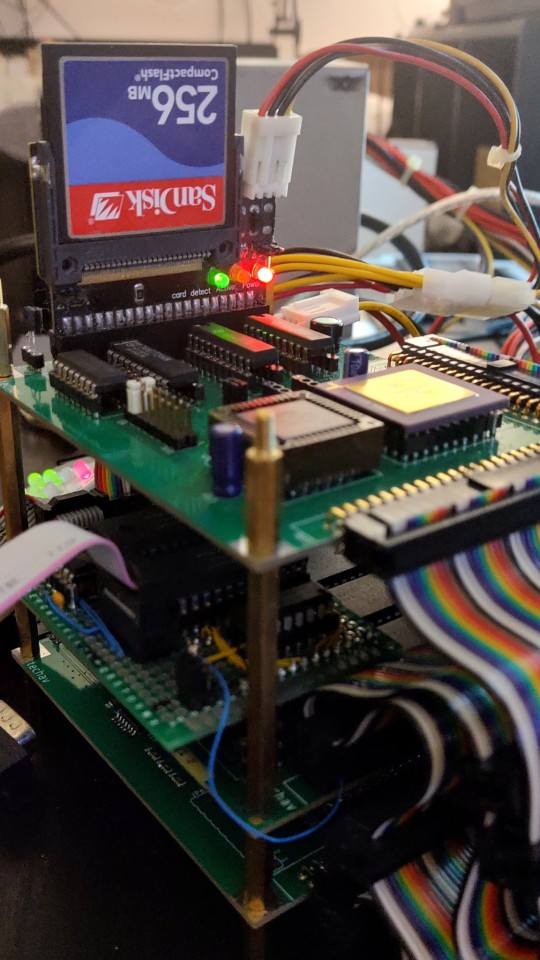
I have more ideas for projects than time or budget to work on them. Already this year I've gone completely through the design process for two new large homebrew projects that are currently too large for my project budget, plus a few small ones I never got around to ordering. So rather than spend more than I should taking on a new project, I decided to revisit an existing one.
It's been over a year since I last worked on the original Wrap030 project — my old stack-of-boards MC68030 system. Its current configuration includes the main board with CPU, ROM, RAM, UART, & glue logic; a hand-wired breakout board to add a second UART; a custom video output board; and a mezzanine board with FPU and provision for an IDE disk that is not yet working. It has been functional in this configuration since last February.
My goal for this project from the beginning was to build something capable of running a proper operating system, like Unix System V or Linux. To do that though, I'm going to need to get disk access working.
I had started on disk access, but didn't quite have it functional when I turned my focus to integrating all of boards into the single Wrap030-ATX motherboard. I had added IDE cycles to the CPLD on the mezzanine board, and had added a few rough drafts of disk functions to my ROM. I set the project aside when I realized my function for checking dish presence was reporting a disk was present when there wasn't one.
I have worked with IDE before — my original 68000 project had an IDE port on it. I had gotten that project to the point where I could read a sector of data from the disk, but never could wrap my head around how to actually navigate even a simple file system like FAT16. It was this code that I had adapted for Wrap030, so when it didn't work, I assumed it was a problem with my logic.
Turns out I had just inadvertently clobbered a register in the disk check function. The logic worked just fine. I was able to write a couple quick BASIC programs to read a sector of data and even run code from the boot sector.
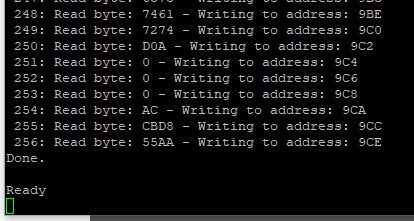

My assembly function for reading data from disk however was still not working.
I tried rewriting it.
I tried rewriting it in C instead of assembly.
I tried again, and again, and again. I added delays and loops and print statements and everything I could think of. I scoured datasheets, read though all the different release versions of the ATA specification, ported code from other projects, looked at every example of reading from an IDE disk I could find.
No matter what I did, I always got the same result.
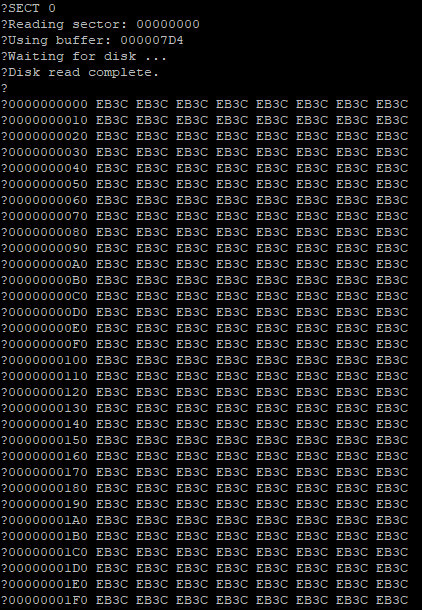
This did not make any sense. Reading from an IDE disk involves setting up the sector address, the number of sectors to transfer, sending a read command, and then reading the IDE data port 256 times per sector. Each time the data port is read, the disk will give another 16-bit word of data. But for some reason, all I was getting was the first word of data returned 256 times.
There is nothing in the specification to explain this.
I knew there was nothing wrong with my logic, because I could read the data just fine with my BASIC program or by manually poking the right addresses using the monitor. Maybe there was some edge case affecting timing when running in assembly, but even adding delay loops and print statements didn't have any effect.
I reached out for help. I got great feedback on my read functions and my timing and how IDE and CompactFlash cards worked, but still could not solve this problem.
But then @ZephyrZ80 noticed something —
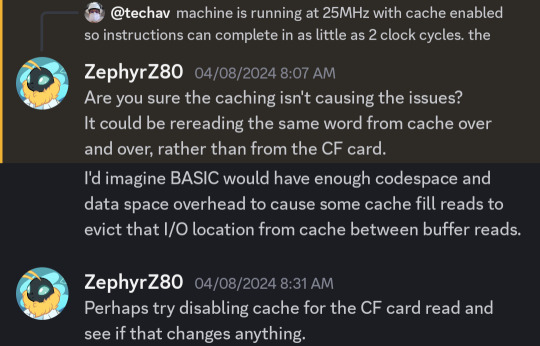
I had shared my code and was explaining that I had added some extra NOP instructions to enforce minimum time between IDE access cycles in PIO-0 mode. At 25MHz with cache enabled, the 68030 can complete an instruction in as little as 80ns, so a few NOPs would ensure enough time elapsed between cycles.
With cache enabled.
… cache enabled.
… cache.
The 68030 has 256 bytes of data cache. My disk read function is running in a tight loop that only really hits a few addresses; not nearly enough to invalidate and flush the entire 256 bytes of cache. The CPU does have a cache inhibit signal to use with peripherals that return new data on subsequent access to the same address, but it turns out I was only asserting it when accessing the UART on the main board.
It's a simple enough hypothesis to test. When I initially added support in my ROM for enabling cache at startup, I included user functions for enabling and disabling cache.
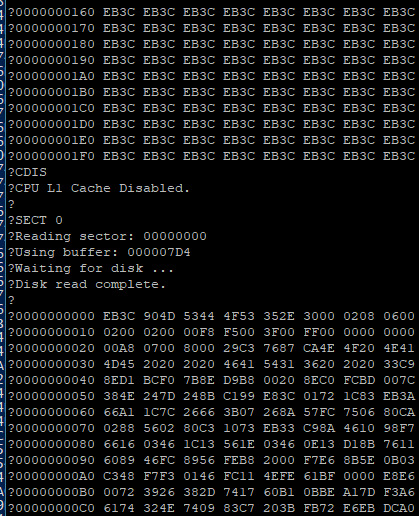
… It was cache all along.
Now I need to add some way to inhibit cache while accessing the IDE port, and then I can move on to trying to use the disk for loading programs.
41 notes
·
View notes
Note
Yarn Cat is really cute and cool! Do you have any advice you’d give to someone looking to give Pico-8 programming a go?
thanks so much! i had a lot of fun making it
so first i'll say, i think pico-8 is a great platform/system/thingy to make games with, and there are plentiful resources to help teach anyone all the things they need to know; nerdy teachers' guide is pretty comprehensive, and lazy devs on youtube also covers a lot, including things like genre and scope choices to avoid newbie pitfalls. pico-8 code is pretty bare bones and therefore easy to pickup the basics of, if you've never done ANY programming before, following some beginners guides for lua (on which pico-8 is based) is probably a good idea, to at least wrap your head around variables, if statements, for loops, and functions; that's all you'll really need.
then my advice bifurcates: if you haven't already cut your teeth making a few games, i'd encourage you to just dive in, mess around, and have fun with no expectations of making a good or even releasable game. i think a seriously pervasive trap a lot of creative people fall into is feeling the need to do it right the first time; agonising over making their first project in a new art medium the perfect one that has what it takes to become an indie darling, and in the process, they waste a lot of creative energy and learn little because they're not doing all the reckless experimentation needed to really learn.
the first step towards being successful in a medium is knowing yourself and how you create in it, which you'll never pick up first attempt at a thing, it takes iteration and reflection. people think that undertale/stardew valley/cave story struck gold on the first try, but i can guarantee you that's just because all the awkward experimentation of their lone devs didn't make it to the spotlight, or even release.
i made at least 3-4 (poorly) finished games long before yarn cat, and even in the 20 years i wasn't really 'trying to make games', i'd still tinker around with ideas that took my fancy to see what worked. even yarn cat started out as one of those messing around projects, until i landed on some fun mechanics that had potential and got serious. so if you're staring out, don't put pressure on yourself to do great, just have fun as if you were doodling in the margins of your school books, and see what you learn about how you make games.
on the other side; if you've already done all the messing around in game dev with a bunch of prototypes and such and want to make a pico-8 game, my advice is this: be earnest about it.
the bbs is full of proofs-of-concept and weekend game jam demos with 4 levels and things that feel more like shitposts and memes than games, because i think people see the limitations of pico-8 and then don't take seriously any project they create in it. to me, it's not just "limitations breed creativity" that makes pico-8 great, but that the limitations are a breath of fresh, focused air in this day and age. when you can download unity or whatever and have gigabytes of assets and scripts and built-in verlet integration physics engines to texture-map flat meshes for your faux 2d pixel-art game.... well, a blank canvas is intimidating, but an infinite blank canvas stretching off into the void when you have an expectation to use 4k textures and run at 120fps is soul crushing. whereas pico-8 says: there is a hard cap of code size, do your best within that.... and i think unfortunately, most people chose to use only a tiny section of it for a small sketch of a game, or push it to do things it's not meant to (yes it runs doom) so they can flex their code skills. i would implore you to do neither; just look at what is possible, feel out what you think you can do within it, and cram in as much of that in there as possible to make the best, fullest game you can.
i very easily could have made yarn cat 8 levels long with a silly party time ending and joke dialogue or something, but i wanted to do more - in gameplay and mood - and have a sort of thematic/emotional through line and a sense of melancholy journey far from the comforts of home... whether or not anyone sees it in the end product, i reached for it, rather than stopping short because "pico-8 is so limited anyway". conversely; there's only enough space on the map builder to have 32 screens in there; but i squeezed out just over double that by using some pretty basic 'unpack arbitrary data from a string' techniques, and ended up almost exactly landing on the code size limit, and if you look at multi-cart loading there is much, much more you can achieve... but honestly, having that limit there in front of me made it possible to finish at all. with an infinite canvas i probably would have quit without finishing a third through, but knowing there was a finite space to fill made me excited to see what i could fill it with, and make it count.
anyway, i ramble.
basically; have fun, experiment, see what you can do, and do what you can. and as with any art; know what you want to say, how you plan to say it, and ask if the thing you've made so far says that at every step along the way.
10 notes
·
View notes
Text
So i have like no formal training in game development and so each phase of my development cycle is this strange combination of figuring out a solution to a problem and learning new elements of coding.
Part of what's nice about code is that it is, at its core, a language (yeah duh) and because of that, you really can combine it in whatever way you want. All you need to know are the moving parts and the kinds of connections you can make and it all has a habit of combing together.
Where I struggle most is degrees of abstraction. This is the space that leaves me the most blank faced. Often times I can hold one or two ideas in my head without understand how they practically function, but any more than that makes the entire house of cards collapse.
The first piece of code that truly left me stumped in this way was a function that would determine the absolute difference in values of two inputs. This was used to determine which direction the monsters would move in order to get closer to you.

This is the current implementation. I needed to ask a much smarter friend of mine to help.
Loops are especially difficult for me because of this. In part, because I don't fully understand how they're structured and a lot of examples I've pulled from to learn about them were multiple degrees of abstraction deep.
I'm going to draw from the function used to find the position of a given value within the array. In practice, this is used to determine the position of a battle:
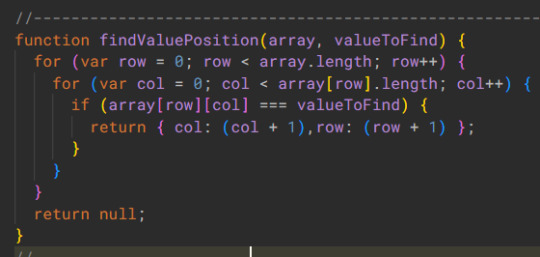
When I first used this code, I really didn't understand how most of it worked. And you may notice this more as I talk about my code without proper terminology. At the time I used this code, I had never put anything in a function's '()'s. I didn't even know anything could go in there. So that took me a solid couple weeks to understand. In fact, it took maybe 3 or 4 additional features being written for it to sink in.
So you can understand how just this degree of complexity threw me off.
For the sake of any reader who doesn't understand how these work and feel (as I do) that all coding documentation is dogshit, the variables included in the '()'s are values which are defined at the time this function is run. So in the function below you can see I call this function as: "findValuePosition("E13:P24", "B")
(Well actually, I call it as 'findValuePosition(arenaArray, "B") in which 'arenaArray' is defined as "E13:P24". Are you starting to see the problem?)
In practice, what this does is allow for easy recycling of a function. If two functions are identical, except for one or two variables, you can use this way of building a function so you don't need two separate functions.

Most of the basic code I've written up to this point, do not include parameters, let alone two.
Super handy. Super obtuse. This is apparently what coding is like.
The issue I then ran into is the compounding obtuseness of this in conjunction with a loop.
Loops are a kind of code you can run repeatedly on their own. You set base values, conditions and behaviours and the code will repeat. Forever. Unless you tell it to stop. Which you might not do, by accident, and it just does run forever.
I'm going to be real, I still only have a passing understanding of how the findValuePosition() loop works. I don't understand how the loop doesn't pass straight through the value its looking for. Or when each instances of looping runs. The timing of the whole operation completely goes over my head, but I understand enough of it to apply and reapply this concept as necessary.
Each time I implement a new loop I understand how it works a little bit better and even now, at the time of writing this, I have a more solid grasp of it than I did when first implementing it.
This is probably the strangest feature of coding. Things quickly go from nonsense to making a lot of sense and its never very clear when that line has been crossed.
Future Concepts
At this point you might be asking yourself why I even bother with this formula at all. The application of finding the coordinates of a fight in the game is limited. In fact, I'm confident nothing uses the output of this function anymore.
However, the value of this function is more about teaching me how to do something like this. It is the principle behind how the game can read its own visual output.
The weird thing about Google Sheets as a platform for game design is that it serves all game design functions within itself. The game is visually rendered in Google Sheets. The game's engine runs in Google Sheets.
It would be the equivalent of being able to store complex code into each pixel of a screen and being able to reference that data. Each cell serves the purpose of pixel, function and database.
In my instance, each cell which makes up the games' 12x12 grid is filled with code that is used to determine what to render based on the values it finds in the back end. But, in theory, you could write new sprites to each cell every update cycle, or reload the full code contained within.
As such, I have a prototype version of the game which uses screen scrolling. This may not be implemented due to various reasons but the principle is there and profound for a platform which still elicits shock when it and game design are mentioned in the same breath.
9 notes
·
View notes
Note
hi there! sorry if you've gotten a similar ask before. do you write wayfarer directly into twine or do you keep it in a separate doc? do you just have really clearly labeled sections in a word doc or something or is there a specific program you use to keep track of every story path? basically, with something as expansive and w/ as many routes as wayfarer, how do you keep all your writing organized?
I have answered this before, but I can't seem to find my posts on the subject (you may want to peruse my coding in twine tag, the masterpost has a bunch of different resources for this kind of thing!).
But in short, no, I do not write Wayfarer directly into Twine. This could functionally work for a very small game, but I would still advise against it as Twine doesn't really work as a word processor. You can't proof-read in it.
My process has three main steps:
Outlining
Writing
Coding
Compiling
Outside of my big beat chart (which spans the whole game), I break each episode down into their own outlines, and then break the routes of each episode down into their own outlines. Sometimes specific sections end up with their own outlines too. My system probably doesn't make much sense to anyone other than me, but as long as I know what the divisions are, then it's all good.
I write in MS Word. Each episode has its own folder (sometimes with subfolders) and every section of the game gets its own document.

Here's the main folders, each episode goes into its own thing.

This is an subfolder for Episode 1, specifically Route B.
Within my word documents themselves, I use a colour-coding system for separating out branches and sections. This is extremely useful for writing dialogue loops, like this:

I also add in any coding notes (variables, true/false states, stat checks) while I am writing so I know what I need to do when I sit down to code 4+ months later. I usually throw a X or XX on choices after I have written them as a note to myself that I have finished it (this is just personal shorthand - X means I've done the pass version of a check, XX means I've done the pass and fail states).
I use about 8-10 colours in my documents; I have a set of MS Word macros set up so I can easily switch between them.
I share my word documents with my editor via OneDrive, which makes it easy for her to got through and proofread.
I use MS Word because I've been using it to write since the 2000s and it's what I prefer to use. I have also been writing professionally for over a decade now, so I have systems and strategies in place that work for me that I've developed for myself over time. But if you're new to writing and you're looking for a word processor that can also help you with outlining and keeping your story straight, something like Scrivener may be helpful.
One the text is ready to be coded, it's a lot of copy/pasting from Word into Twine. When I'm coding I will typically be running multiple programs at once:
MS Word
MS Excel (for my variable sheets)
Twine
Notepad++ (which has some regularly used code stored in it; I also use it to edit CSS and Javascript, as well as any really code-heavy sections since it's easier to do that in Notepad++ than it is in the Twine editor)
Notepad (just the regular version - I use it for writing notes to myself while I'm coding)
a web browser to launch tests in as I code
Once I am done coding and I have tested things, it's time to compile. The Twine editor can only handle so many passages and text in one file (around 500-700 passages before you hit massive lag), so I break Wayfarer into multiple story files. Having multiple story files also makes it really easy for me to cross-reference events (if I need to grab a passage title to reference it later) because I don't have to look through one big file. If I know the event happens in Episode 2's first scene, then I know I need to open Chapter_2.1.
My Twine library looks like this at the moment:
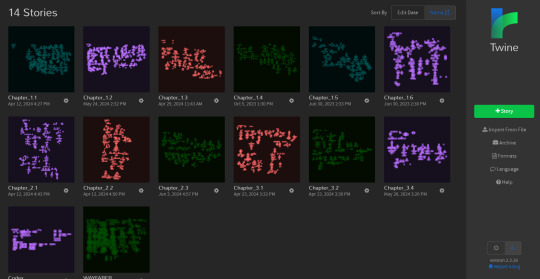
I am using an old version of the editor (with an up-to-date version of SugarCube) since I didn't like the new one. I don't necessarily recommend using the Twine editor when you can easily make your game with Twee extensions in Visual Studio Code and have better support and functionality, but this is what I like and it really comes down to personal preference.
But because everything is in separate files, I have to merge them altogether. I have Tweego installed on my PC; it's run through the command prompt and outputs multiple story files into one HTML file. I've talked about this process here and here.
And that's basically it! I don't think there's a one-size-fits-all solution to keeping track of your IF. You need to figure out what works for you, based on your writing and outlining habits, how big your story is, and how much you intend to keep track of.
Hope this helps!
#wayfarer#wayfarer if#coding in twine#twine#twine game#interactive fiction#interactive novel#answered
46 notes
·
View notes
Text
The amazing Catch 22 of going off antipsychotics is that, if you've been on them long enough, when you go off of them they will almost certainly increase your psychotic symptoms for at least a while. Your brain adapts to function with less dopamine, serotonin, et c. over time and so when you go off antipsychotics and your brain has more of those, it can have a bigger effect and thus you experience more symptoms.
Psychiatrists should and most often do know this, but they'll pretend like it isn't a thing that happens. If you go off your meds and you start acting a little weird, that's not a sign that a known thing that usually happens is happening, no, you're relapsing and you're a danger to yourself and others and you better start taking your meds again (the ones that made you feel awful and dampen your thinking and in my case are causing my eyesight to physically deteriorate) or "I'll have no choice but to send you to hospital".
The fact of the matter is that psychiatrists are never going to let you go off antipsychotics if you wait for their permission. When you first go on them you'll be told that if you're "stable enough" eventually you can go off them, but then once you're on them suddenly you need to be on them forever because "we" can't risk you having another episode.
The fundamental problem is that psychiatry fundamentally does not care about helping people live better lives, it cares about stopping people being a problem. It's a tool to enforce conformity, and oh boy do antipsychotics enforce conformity.
Of course antipsychotics are very helpful for some people. Even for me there was a time in my life where I genuinely needed them. I felt an enormous sense of relief when I first went on antipsychotics. Sure I felt like shit physically, I was tired all the bloody time and I struggled to do a lot of things (because antipsychotics only really treat positive symptoms), but being able to just go outside, see other people, exist again, without constantly being terrified of everything and everyone was really very nice. The problem comes when you're denied to ability to ever stop taking them.
Through a combination of changing psychiatrists repeatedly and basically bullying them (which btw I'm convinced I was only able to get away with because I live 150km from the nearest psychiatric centre and there are literally no police in my village, both of which make it harder to threaten me with hospitalisation) I was eventually able to get down to a pretty low dose of antipsychotics. I'm talking doses that really should not have been effective for treating psychotic symptoms. I went from 5mg/day of risperidone to 50mg/day of quetiapine (I know that seems like an increase but the two have very different dosage ranges), literally 1/6th of the recommended dose for treating psychotic symptoms. Yes, my symptoms increased — I hallucinate more frequently and I sometimes get stuck in those weird pseudodelusional thought loops again — but so did my quality of life. I learned pretty quickly to manage things on my own and I was doing significantly better in almost every major area of life.
I didn't tell my psychiatrist about the increase in symptoms (because frankly they don't bother me much and I know that's all she would see), only about the positive changes. She knows lowering my dosage made me do better in almost every way, and yet she is constantly trying to up it again. And don't even think about going off of them, I've been trying to get her permission for that for months and she's made it very clear that it's not happening. I dropped the subject when she said the word "noncompliance" (for those of you not in the know, this is a code word for "do what I tell you or I'm locking you up").
So I went off without her permission. I just stopped asking and did it. And you know what? I'm very glad I did. I hallucinate more, sure, but I'm also happier and more capable than I've been in a long time. I still keep a bottle of antipsychotics in case things go south, but if I can manage it I'm never going to open it again.
Am I going to tell my psychiatrist this? Absolutely the fuck not. Why? Because, again, at every point, with every psychiatrist I've ever interacted with, they have made it abundantly clear that they don't care what helps me. What they care about is that I'm obedient. That I'm what they define as "normal" (or as normal as a crazy like me can be), which is to say, in the background, not causing any trouble, not requiring to be treated like a human being. So no, I'm not getting your permission to stay off my medication.
Everyone else gets "informed consent" in their healthcare, why don't I? When I go on a pretty harmless medication for a physical condition, I'm given a massive list of potential side effects that occurred in like 0.01% of the tested population and given 50 different opportunities to change my mind, when I go on antipsychotics, I don't get to find out that they pretty commonly cause vision loss until a year later when I'm freaking out because in that same time I've gone from having better than average vision to not being able to make out someone's face from 3 metres away.
They don't want to help you. The fact they sometimes do is just a happy little accident.
3 notes
·
View notes
Text
Hubris Bracket Side A Poll 12: Five Pebbles (Rain World) vs Laerryn Coramar-Seelie (Critical Role: Exandria Unlimited Calamity)
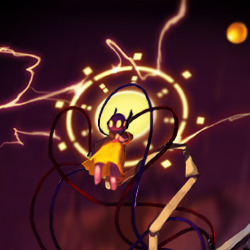

Propaganda below (contains spoilers)
Five Pebbles

in his pride and arrogance he thought he could solve the great problem, he got interrupted during one of his experiments because in the process he was killing one of his neighboring robots (he is a robot btw) and she was asking him to stop, now he blames her because the creature he was making mutated and essentially led to him developing 'the rot' which slowly eats away at his superstructure until it eventually kills him.
hes like a pathetic wet cat to me. guy who tries desperately to break out of his doomed narrative only to doom himself further and drag those he loves down with him. he didn't want this he didn't want any of this but in his rage and arrogance he was blind to the consequences of his actions. and now he stands slowly rotting away while his sister suffers because of his mistakes. he is sooo full of regret and anger and shame i love him
(this one is very long so we have opted to keep its original formatting for reading's sake)
GOD where do i even start with five pebbles…the hubris contained within this bitch…the angst…the regret… for a basic rundown of general rain world stuff, everything in the world is trapped in a looping cycle of life and death. eventually people adjacent things were like "dam this sucks i wanna. kil myslef" and then they dug really deep into the earth and found void fluid which kills you so hard you don't come back. however if youre a bitch or too attached to the earth u turn into a terrifying ghost thing. so the people were like "fuck that lets find a different way to kill ourselves" so they built big supercomputers called iterators then they all killed rhemselves anyways with the kil juice.so you have these godlike teenagers basically locked in bigass boxes just. everywhere every fucking where theres so many.
five pebbles is one of these iterators, and whats special about him is mainly the place and reasons he was built. iterators need a shit fuck ton of water to function (and they exhale a shit fuck ton of water vapor "turning…world, into rain world." -daszombes) so generally iterators aren't placed too close. another iterator named looks to the moon was built very early on, and eventually she couldn't make enough stuff for her people who live on top of her (forgot to mention that) so they fucking. built another iterator RIGHT next to her. pebbles and moon are like siblings, right. hes kind of an angsty guy but i mean his creators literally all killed themselves and left him solving their problem so its ok hes allowed to be. hes like "damn i hate veing trapped in this cycle and shit it sucks" and then there was a very big event that i DO NOT have the time to get into but essentially one of the iterators was like "hey guys i solved the problem" and then she fucking died which is very hard for an iterator to do so everyone had an understandable freakout.
five pebbles was of the opinion that killing herself was the solution so hes like "i have to make them see that killing yourself IS the solution" (killing yourself and/or genetic mpdification are very very taboo topics among iterators) so he goes to one of his close friends and has a real heart to heart about how much he struggles with knowing that his creators CHOSE to leave them all behind and that the iterators are all still here solving their problem even tho they're dead. this friend, in a moment of weakness sends pebbles instructions on how to circumvent the self-destruct taboo (a taboo is like a law coded into every single cell of an iterator) and five pebbles, desperate to prove to himself and others that he isnt just another useless thing that can be abandoned, so he looks at the proper, safe way of doing the procedure and goes "FUCK THAT NOIIIISE" bye running so many parallel processes he consumes five times the amount of water he usually intakes, as well as shutting off all communications. moon, having been dehydrated to the point where he structure is in an awful, awful state, eventually uses a last resort in the form of forced communications, essentially the buggest loudest discord ping of your life. her messages are pleas for pebbles to stop, that he is hurting her, that she WILL die if he continues.
on pebble's end, as he tries to concentrate on his absurd amounts of processes, moon messages crash through his communications network, COMPLETELY shattering his focus. due to the nature of this method, involving genetic modification, what is essentially cancer is allowed to burst free, uncontrolled, from his experiments. they call it the rot. pebbles, having killed his sister and cut off everyone else, desperately tries to cure the illness ravaging his structure, an effort that proves futile.
Laerryn Coramar-Seelie
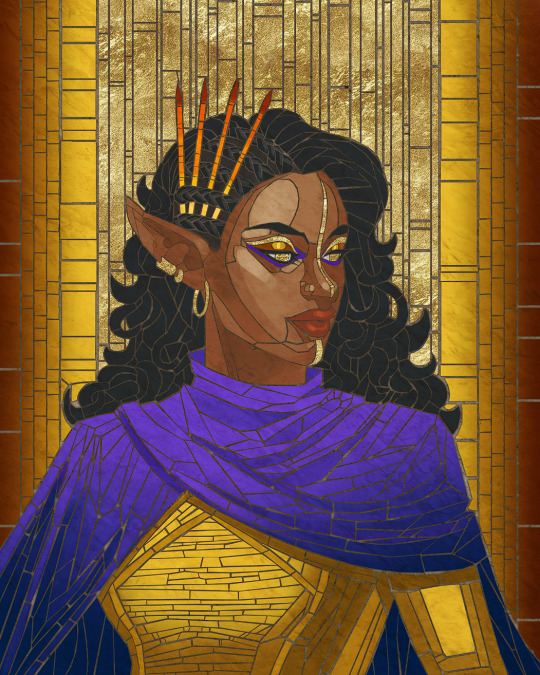
Laerryn devoted her entire life to making the city of Avalir capable of teleporting to the Upper Planes so that the entire city of mortals would be walking as equals amongst the GODS.
laerryn my beloved. the OG hubris wizard, dead before the story even started & it was her own fault. she used all her city's magic supply to be able to TELEPORT the ENTIRE CITY to a DIFFERENT PLANE because she COULD. because she wanted to prove that SHE COULD. because she thought the gods weren't all that special and wanted mortals to be equal to the GODS THEMSELVES. COME ON. she could have easily made it safe but she was so determined to accomplish this in time that she used way too much magic and put the whole city in danger. she wasn't thinking about safety, she was thinking about what she could accomplish. she also got one of her best friends, who was a husband and a father to a young child, KILLED, due to experimenting on said aforementioned 'attempting to teleport the entire city to a different plane' thing (complete disregard of safety once again). to list her lesser hubris crimes, she neglected her marriage and got divorced bc she was so focused on her work and herself even though she loved her husband dearly and convinced herself she was doing all of this for him, even though this is never something he wanted. also she cast blight on a super important tree that could have saved the world, and destroyed it. and yeah it was because she wanted to protect her friends/out of love/grief BUT she basically set in motion the rest of the events of exu calamity (aka, oh yknow, the DESTRUCTION OF MOST OF THE WORLD) by doing that. by thinking she COULD save her friends by destroying the tree. basically, she thought she knew better when she very much didn't. i'm not saying she caused it (the betrayer gods caused it obvs), but she for sure had a large part to play in the destruction of her own city (and also in saving it, but still). basically i love her. HUBRIS QUEEN.
#hubris bracket#Laerryn Coramar-Seelie#critical role#Five Pebbles#rainworld#rain world#exu calamity#exu laerryn#(mod bee here: both extremely strong contenders with a lot of similarities. anyone's game for sure.)#(however am i biased towards laerryn? yes. i love her.)#round 1
89 notes
·
View notes
Text
On one hand, I hate my robotics teacher for teaching us the same lesson on python loops we've been learning for half the damn school year, then expecting us to make an innovative robot in 3 weeks when arduino is based on C++.
I was gonna counter that with something else, but as I wrote it I realized just how stupid it actually is. Fuck it. Venting time.
NO CUZ I CAN'T UNDERSTAND THIS GUY. WDYM "Programming's easy! You learn the basics, and from there you make your own solutions." ??? That's not verbatim but. STILL.
I'll give him a bit of credit, he taught us the basics of arduino. The proper syntax, loops, variables, functions, motor control, sensors, etc. But for god's sake, that limited pool of knowledge can only get you enough to make a mini car! It would've been nice to learn about fading LEDs, integer overflow, pointers vs the actual value in a variable, OR EVEN WHAT DOCUMENTATION IS. YEAH. DOCUMENTATION. THE LITERAL OFFICIAL EXPLANATION FOR KEY FEATURES IN PROGRAMMING LANGUAGES.
But suddenly its OUR fault our code doesn't work because "I taught you the basics. If you don't understand, that means you're not listening during my classes." MAYBE IF YOU STOPPED TEACHING US WHAT A FUCKING FOR LOOP IS, WE'D HAVE A REASON TO LISTEN. Majority of my understanding of robotics are a product of self study and receiving help from my family and their long list of IT contacts.
Not only that, HE is the one that approves of our robotics projects. If YOUR students can't complete the project YOU personally approved of, isn't that an error on your part? You should know what your students are capable of making. You should know because they should only know WHAT YOU TEACH THEM. So surprise surprise when your students feel like they're forced to hire people to do their projects, all because of your failure to teach them the skills they needed to do it themselves.
The only people getting a passing grade in this class are gonna be those that are either rich or have a lot of contacts. What a fucking joke.
And don't be mistaken, this is NOT the complaint of someone who doesn't understand programming. I consistently get 90% and above on his exams and do coding for fun. I'm complaining on behalf of my classmates who weren't as lucky as me, in that I have way more people to ask help from.
"100% working by this week" my ass. Actually teach us something relevant for once.
#dumb ramblings#vent post#ough#for the record i do like coding in python#i prefer it over C++ actually#But none of our projects use python#so I don't know what's going on in my teacher's head...
4 notes
·
View notes
Text
Week #3
Introduction
For this week I knew I needed to spend a little time narrowing down what I wanted my topic to be. Next week I plan on spending most of my time on that task but I still need to do some thinking now because I’m at a point where I’m encountering recurring issues:
Issue #1: I know I want to do something personal relating to finding one’s identity and how hard that can be growing up when you feel othered or like you don’t belong. I just don’t know if I want to use the lens of nostalgia, horror, or both to convey feelings of discomfort? I’ve enjoyed the research I’ve done but I just don’t feel totally set on that yet even though I spent the last two weeks largely looking into it.
Issue #2: I haven’t seen a lot of horror? It’s a genreI stayed away from for so long, and it’s only been a recent thing that I’ve felt like I want to explore more and I feel drawn to, but I'm not knowledgeable on the subject so I need to decide if I want to pivot off of this or not. I think the form of horror I’ve consumed the most is through video games so I could spend a week diving into that.
I am hoping my research this week leads me in the right direction.
Research
I sent out a google form this week asking questions related to horror/thriller genres in media people consumed growing up and how they might have been affected by them. I also wanted to know why people really like these genres or why not.
Do you consume media (games, films, TV, books, videos) containing horror/psychological/thriller elements?
When you were a teen/preteen, what were some of the memorable pieces of media in those genres that you consumed?
Are you drawn to these genres? Why or why not?
Do you remember any media in these genres being particularly nostalgic for you?
Are you easily scared or frightened? Did/do you have a lot of nightmares often now or when you were younger?
I sent this out on monday to some friends and as of writing my blog post I’ve gotten 8 responses. There is a wide variety of answers which I’m very happy about. I found it interesting that I had responses in all 4 quadrants of this table.
Enjoys horror and gets scared easily
Doesn’t enjoy horror and attributes that to getting scared easily
Enjoys horror and isn’t scared easily
Doesn’t enjoy horror and isn’t scared easily
The question about nightmares led to some interesting thought processes and I might look into that more. Like I had one person say that they are super anxious and got a lot of nightmares as a kid but don’t like horror not because it’s scary but because they find a lot of it to be “cheesy”. Another person said they have to watch horror media during the day which I definitely relate to. It reminded me though how the dark is an extra layer of scariness because of the unknown that comes with not being able to see your surroundings well.
Overall there’s a lot more that I learned from the responses so far and I think it helps me find some more things to look into as potential points of views surrounding maybe the eyes and identity or nightmares and identity etc.
Creative Research
One of my friends had mentioned I should look into OpenProcessing, which is an online platform that allows people to share and explore creative coding projects made with p5.js and other programming languages. It's like a social network for artists and programmers, where you can find, showcase, and collaborate on interactive artworks and visual experiments. I just started learning JavaScript and using the p5 library this year and the generative art side of the website drew me in.
Some examples of cool things that I was looking into on the website:

https://openprocessing.org/sketch/1270210

https://openprocessing.org/sketch/2065676
https://openprocessing.org/sketch/2095152
Over the week I ended up looking into tutorials on the basics of making sketches. This one guy has a good series on different topics like shapes, loops, color, trig functions, noise. I just spent time learning more about generative art and I think these skills can help me in the future of wherever I head in my project.
youtube

Reflections
This week I think I gained some good insights. I know I want to work with identity and research something related to that pain and discomfort that comes with trying to find your identity, especially growing up in the preteen and teenage years. My creative research was not connected really to my reflection but I do think I will use what I learned in the future of my project. I know for next week I will continue to expand upon what we worked on in class with identifying a point of view and I have some really good ideas I just need to look for gaps in information now.
2 notes
·
View notes
Text
The Impasse
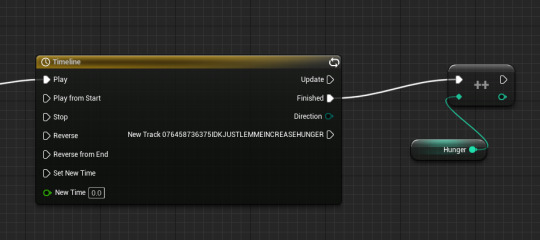
"I haven't failed, I've just found ten-thousand ways that won't work."
After trawling the Unreal forums, I found a suggestion to use Timelines instead of EventTicks. Just set your timeline to loop, and make the track length however long you want your delta seconds to be. This still doesn't work, so I'm going to try and ask my tutors. Thing is, it seems even they're stumped half the time. I was sure I hadn't overshot with this project - it should be so simple, and yet nobody can do it. Every 0.25 seconds, increase Hunger by 1. When the event Knockback plays, cast to player and subtract 5 from Hunger. Make Chubb's speed a function of Distance plus Hunger, with some other calculations between. That's all it is. But I can't do it on my own - and believe me, I've spent a LOT of time experimenting, breaking my code, rebuilding it, and getting nowhere. More than just what I've posted on my blog, actually. Sometimes my hypotheses are right and my code does what it's supposed to, but most of the time I don't even know where I've gone wrong.
This is my true frustration with the project. Yeah, I lost a week deliberating over the old Oubliette build and another week juggling three projects all effectively named the same thing, but when the answer to my problems is SO CLOSE and yet I can't figure it out? That's worse. The end date is coming closer and closer; I basically have three days of college work left. Thursday, Friday, and next Wednesday. The other days might as well not exist - I only have access to Unreal, Photoshop and all the rest when I'm at college. So I need to allocate my time really well... and then this! It's not like TWL where I had these surplus ideas I could just not use, the heart of the game just ISN'T THERE! I need this to be fixed, and I need it soon, damn it. Maybe tomorrow? There sure isn't time today.
6 notes
·
View notes
Text
Learning to Learn
Over the course of 12ish weeks, our team of 3 had been working on a game for a project. Alongside, I had another project that documents my journey into learning coding in Unity. The blogging of my docuementation was meant to start a few weeks ago, but with the news about Unity happened. Whilst I know that it doesn't effect my team and I, it had dampened my motivation to post publicly and worry about my future in making games. So I had made just made pages about systems and the development process of our project.

Below is an average overall reflection on my short journey learning to code as an artist
In this project as the programmer learning on the way, I had taken different self-study approaches and talked to a few others to help with my work. Whilst I could visualise how code would look in my head, applying it didn’t always result in what was intended. The biggest culprit was the dialogue system and my own stubbornness to use other users’ packages to aide with the project. Admitting to myself that a task is too difficult, especially with the knowledge I lack in the field, was probably the first step in making progress in development.
Did I do a lot of coding?
Yes and no.
Yes, as I written up multiple attempts at dialogue systems and understanding how loops work.
No, ‘cos I ended up not using 80% of it in the final project.
In saying that, sometimes it is best not to write too much to overcomplicate code that gets interweaved with each other. I found it better to write small individual code that is independent from one another to avoid confusion.
How do I feel about coding now?
It’s fun when it works and makes me rethink life when it doesn’t. Coding, at least in Unity, has methods and functions (are they they same? I don’t really know) that are fairly obvious, like OnTriggerEnter happening when something enters the trigger collider and SetActive to change if the object is active in the scene.
It’s when there is a very specific thing I want that it becomes confusing, where I need to problem solve with the tools available. Making a timer and path for an object to follow separately is fine by it itself, but when combining them I somehow becomes a mess of connected scripts and variables (at least when I work).
I am thankful for all the tutorials online (especially Brackeys lolol) that dive into the lines of code and break them down into their purposes. With the way they explain and use pseudo-code to visualise the process in which the code acts, I can apply their teachings into my own needs by moulding and splicing them together.
Whilst I’m not the best at it, I’d like to think I’m competent enough to code up basic things and branch off from there. Now, the way I see code is similar to reading a recipe or composing music, with steps to follow and jump back and forth from. It’s also great to look at others work and understand their own processes and see what commonalities they all have.
So, what is my learning style?
With the huge setback in Week 9 with restarting of the project, I found that I work best under pressure. It’s not the best and healthiest, as it stresses me the heck out, but it had given me the best results and steam ahead. However, I end up taking huge breaks after deadlines are hit and am reluctant to go back. It becomes a lopsided cycle where majority of the time I’m taking a break or just sitting at the desk and glancing at the project momentarily.
As Wu in 'Time pressure changes how people explore and respond to uncertainty' had experimented, I am less relucant to work when time pressure is forced onto me. I don't worry about the risks and I instead worry if I can even complete the outcome.
Thinking about it deeper, it’s really just Pomodoro but flipped around. That style of learning I had found to grant some progress at the beginning, but soon began to lose its effectiveness as I had begun to just wait for the clock to tick by until my next break.
So maybe for my next game or game jam, I’ll use this technique because I’m soon going to be unrestrained by the clasps of attending classes and multiple deadlines for entirely separate subjects.
Did I have fun?
Only at the start with the character controller lol
Otherwise, it’s a no. I like art too much.
5 notes
·
View notes
Text
October 2023 Development Log!
Hello everyone! Happy October~ Time for a monthly progress update!
I'll start off with the big stuff: I started migrating game engines, from Unity to Godot. You can read the rationale behind my decision here.
GAME ENGINE MIGRATION HELL…OR NOT?
Overall, the migration is going fairly smoothly! Godot has pretty robust C# support at the moment, so I was able to migrate/translate a fair amount of my basic C# codebase from Unity to Godot without issues. Visual novels are pretty lightweight games, so apart from some issues with mobile builds, I think it will go well, and I will continue working with Godot for the time being.
After I spent a few days experimenting with the systems, I programmed in my story parsing logic and finished a basic game loop. Currently, the text handling is complete, with all of the functions that I initially coded in (branching paths, nested choices, conditionals, etc.) Auto and fast forward are also functional, and I also worked in the saving/loading. In addition, I added a few additional functions: sections (the ability to parse the same text file into different scenes), checkpoints (the ability to easily navigate back to a specific line), and "unsticky choices" (the ability to make choices "disappear" if you've seen them once).

I also programmed in a NVL mode. For anyone that's not familiar with VN lingo, the standard format of sprites on top with the text box below is called "ADV" mode, whereas "NVL" mode features text overlaying the entire screen (usually with some kind of darkened background for visibility - like above). NVL mode is less common in VNs nowadays, but it's useful for long monologues or narration (whereas ADV is best for dialogues). I also coded in the ability to swap freely between NVL and ADV mode.
In addition, I implemented customizable text. Basically this is text that can be adapted based on user input. For anyone who has played games with customizable protagonists, this is useful for adding things such as pronouns.
I also worked on a few simple "polish/quality of life functions" (that existed in my Unity build, but required new code and a bit of fenegling to work in Godot):
-A typewriting effect so that text fades in instead of being shown all at once.
-Text boxes that dynamically size based on the text inside.
-Making buttons scale as you hover over them.

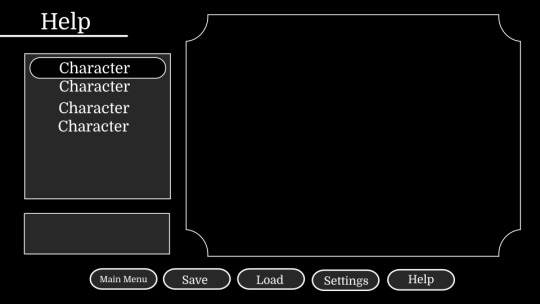
I also designed some new basic GUI. While I'm not sure I'll actually use this GUI unaltered in any game, this is a good "base framework" with all the necessary elements.
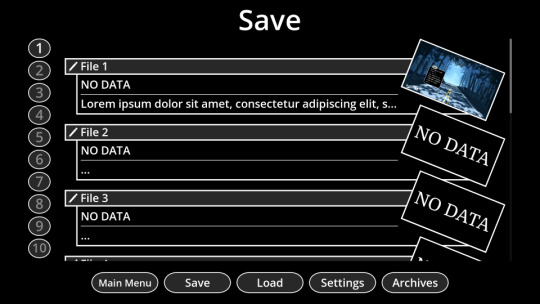
The updated save screen now has 100 save slots (I'll see how large the save files get and adjust accordingly), and it saves a screenshot of the current game screen in addition to the current line. (I was pretty proud of myself for this one!)
Lastly, I started working on a rollback function. If you're familiar with Ren'py games, you know that when you scroll up on the mousewheel, it basically "reverses" the game so that you can easily go back and reread text or play different choices. I didn't implement this when I first made my framework in Unity because it is a bit complex; there are a lot of variables and edge cases that you need to take into account, and it basically requires me to "double" the amount of code, as I need to account for both a story running forwards and a story running in reverse.
Since I'm basically rebuilding my framework from the ground up, I thought it would be a good opportunity to try to implement a rollback, as I can code it in pieces as the codebase is being built. Currently, rollback is functional!
EVERYTHING THAT'S NOT CODING HELL
My focus this month was The Deepwater Witch! The sprites for the leads are fully rendered, with two variations for each, and now they just need to be animated. Around a third of the CGs have been storyboarded, and I also took reference photos for the backgrounds. The script is up to 26,281 words.

I also worked a bit on character designs for Hanasu, the Karamu sequel.
PLANS FOR THIS MONTH
For coding, I will start implementing basic visuals - sprites, CGs, and backgrounds - before moving on to audio, visual effects, and other advanced visuals (animated panels, etc.)
For everything else, since Once Upon a Time VN Jam has officially started, I will continue focusing on The Deepwater Witch until the first draft of the script is complete, and all of the CGs and BGs have been storyboarded. After that, I will start working on my other projects with less immediate deadlines.
Thank you to everyone who's keeping up with my development shenanigans! If you want to hear from me more often, I post most of my major announcements here and on Twitter. I also post almost daily on my Patreon with sketches, writing snippets, sneak peeks, high resolution art, and weekly devlogs.
5 notes
·
View notes
Text
Master the Code: How Java, Python, and Web Development Tutoring on MentorForHire Can Supercharge Your Tech Career
In a world powered by software, coding is no longer just a niche skill—it's a core competency. Whether you're looking to break into tech, ace a coding bootcamp, land your first junior developer job, or scale your expertise as a senior engineer, personalized mentoring makes a dramatic difference. That’s where MentorForHire.com comes in—a platform that connects you with industry professionals for hands-on Java Tutoring, Python Tutoring, and Web Development Tutoring.
Here’s how specialized tutoring in these key areas can accelerate your learning journey and help you achieve your software development goals.
Why One-on-One Coding Tutoring Beats Generic Online Courses
Self-paced tutorials and free courses are great for dipping your toes in—but when you're serious about growth, they often fall short. Why?
You don’t know what you don’t know.
Debugging can become a time-wasting nightmare.
Without accountability, progress slows down.
You’re not getting job-ready feedback from a real developer.
MentorForHire solves all of these problems by connecting you with real mentors who’ve worked in tech and know what it takes to succeed. Whether you're working on a class assignment, preparing for interviews, or building a full-stack project, you'll get tailored support.
Java Tutoring: Build Enterprise-Grade Skills from the Ground Up
Java isn’t just for beginners—it powers billions of devices, from Android apps to massive backend systems used in finance, healthcare, and e-commerce. If you're serious about software engineering, Java Tutoring offers a rock-solid foundation.
With a mentor, you can:
Understand core concepts like classes, inheritance, interfaces, and exception handling.
Master data structures and algorithms for whiteboard interviews.
Build scalable applications using Java frameworks like Spring and Hibernate.
Get help with unit testing, debugging, and version control.
Prepare for certifications like Oracle Certified Associate (OCA) and Oracle Certified Professional (OCP).
A mentor will not only explain the "how" of Java development but also the "why"—turning you from a coder into a software architect-in-training.
Python Tutoring: The Most Versatile Language in Tech
Python has become the go-to language for beginners and professionals alike because of its simplicity and power. Whether you want to get into automation, data science, machine learning, or back-end web development, Python Tutoring gives you the skills you need to thrive.
On MentorForHire.com, Python mentors can help you:
Write clean, efficient, and maintainable code.
Understand essential concepts like functions, loops, list comprehensions, and file I/O.
Use libraries like NumPy, pandas, Matplotlib, and scikit-learn for data analysis.
Build web apps with Flask or Django from scratch.
Automate tasks using Python scripts or integrate with APIs.
Whether you're solving LeetCode challenges or working on a startup prototype, personalized tutoring can take your Python skills to the next level.
Web Development Tutoring: Learn to Build the Web, Not Just Consume It
Today’s digital economy is built on the web—and web developers are in high demand across every industry. But with so many tools and frameworks, it’s easy to get overwhelmed. That’s where Web Development Tutoring comes in.
From front-end to back-end to full-stack, tutors on MentorForHire.com can guide you step-by-step:
Front-End Skills:
HTML, CSS, and JavaScript fundamentals
Responsive design using Flexbox and Grid
JavaScript frameworks like React, Angular, or Vue
Version control with Git and GitHub
Back-End Skills:
Node.js with Express or Java with Spring Boot
REST APIs and database integration (MySQL, MongoDB)
Authentication systems (OAuth, JWT)
DevOps basics: deploying apps with Heroku or AWS
You’ll work on actual projects like to-do lists, dashboards, or e-commerce stores—and get expert feedback every step of the way.
How MentorForHire Makes Learning Easier and Smarter
MentorForHire.com isn't just about hiring a tutor—it's about mentorship. The platform matches you with experienced developers who offer:
Flexible scheduling – Learn when it suits your life.
Customized roadmaps – No more cookie-cutter syllabi.
Real-world projects – Build apps that solve actual problems.
Code reviews & interview prep – Gain confidence before job applications.
Ongoing support – Whether it’s bugs, burnout, or breakthroughs.
This isn’t a YouTube tutorial or a lecture—it’s a partnership. Whether you're 16 or 60, learning to code becomes faster and more meaningful when you have someone guiding you in real time.
Who Is This For?
Students who want to stand out in their CS classes
Career changers entering tech from another field
Bootcamp grads who need more 1:1 help
Junior developers looking to climb the ladder
Entrepreneurs building their own software products
If you’ve got a goal and a laptop, MentorForHire.com has a mentor ready to help you reach it.
Final Thoughts: The Future Belongs to Lifelong Learners
The best investment you can make is in yourself. Whether you're learning Java, diving into Python, or building full-stack web apps, tutoring turns passive learning into active progress.
MentorForHire.com helps unlock your potential by giving you access to mentors who’ve been where you are—and know how to help you level up.
So why wait? Start your personalized tutoring journey today. Visit MentorForHire and connect with a mentor who can help you write your success story in code.
0 notes